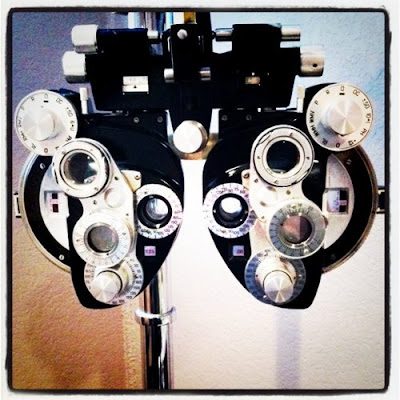The scene: The airport, Air Canada terminal, ten o’clock. I am about to enter the security queue when a terrible realization flashes before me: I’ve left my plastic ziplock bag of liquids and creams on the table by the door at home. (You know, so that I would be sure not to forget it…) At this point, you might ask, “Why is this such a tragedy, Sophie? Surely you can buy makeup and travel-size toothpaste in Montreal?” On this point, you are not mistaken: While a minor inconvenience, the need to purchase emergency audition makeup is certainly not earth shattering. But! I need contact lenses – contacts I am not currently wearing, and contacts I will need to be wearing for my audition. My heart sinks.

A representation of my troubled mien; my large glasses.
Of course, there is no written rule that says I cannot wear glasses while singing, but I would certainly prefer the third of my face that is obstructed from view by my bulky frames to be visible to my audience. Let us call it an unwritten rule, then. Nor am I integrally blind without contacts – I surely won’t be able to recognize any faces, but I probably won’t run into the wall, either. (Probably…) So why can’t I simply go in blurry-eyed?
Focus: when I cannot focus literally, I have a considerably harder time focusing in any other capacity. This was made excruciatingly clear to me last year during a studio class (wherein a teacher’s students attend and sing in an intra-studio masterclass). I went up to sing a relatively fresh piece, was asked to remove my glasses for expressive purposes, and felt immediately out of my element. Not only was the visual world blurry around me, the music sounded more unfamiliar. I struggled with the simple task of counting the beats; I couldn’t remember the words in advance. I was swimming through an aria I had already sung from memory earlier that day.

Focus is a keystone to performing – on stage, as well as in any other field (how many books, coaches, and courses are dedicated to finding focus in sports, or business, etc…?) – and it is something that everyone is concerned with finding, refining, or keeping. It is not the same thing as thinking. Often, in fact, we (we singers, and we humans) are told to stop thinking and start doing. Because this is what performance is: the result of months or years of thinking, analyzing and practice come to a head in an instant of action. Concentration funnels all this training. The paradox is that the more focused we are, the more we are able to let ourselves go. It allows actors on stage to be simultaneously desensitized enough to the outside not to be taken aback by disruptions and aware of their surroundings enough to improvise when things go awry. But without focus (and previous, hard work!) you are simply left trying to think and process very fast. In certain cases it works, or at least well enough. But a performance is not about letting others in on the odds and ends of your work process; it is about sublimating these into something greater.
For the sake of our subject matter, let us get back on track. How does my woeful story of missing contacts pan out, you ask? Do I muster up the courage to go in blind? No: I arrive in Montreal, and with a bit of digging and a bit of luck, I come across an office that will fill my prescription without a new eye exam. So my odyssey comes perhaps to an overly neat end, but one that I certainly prefer!

First time in your blog and enjoyed reading your post a lot! :) So how was the audition ?
ReplyDeleteThank you for visiting my blog and for your kind words about the pictures!
ReplyDeleteI enjoyed your post about forgetting your contacts and can absolutely relate to the "setting something out so you won't forget it, then forgetting it" thing! Story of my life :)
Sunshine - It went well, thanks!
ReplyDelete